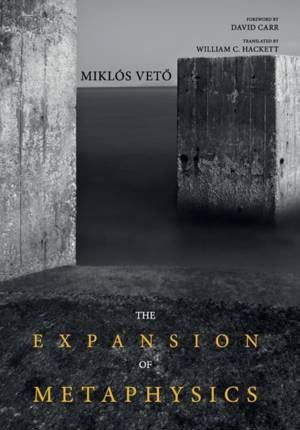
- Afhalen na 1 uur in een winkel met voorraad
- Gratis thuislevering in België vanaf € 30
- Ruim aanbod met 7 miljoen producten
- Afhalen na 1 uur in een winkel met voorraad
- Gratis thuislevering in België vanaf € 30
- Ruim aanbod met 7 miljoen producten
Zoeken
Omschrijving
The culmination of a lifetime's preoccupation with crucial human concerns too often curiously marginalized by the history of philosophy, The Expansion of Metaphysics sheds new light on freedom and the will by making the phenomenon of novelty philosophically intelligible. The a priori synthesis of Kant is joined to Judeo-Christian themes (the kenosis of Christ in the incarnation and the tzimtzum of God in the creation) in order to develop a doctrine of ""superabundance"" (freedom and love) and ""singularity"" (with the Work of Art and the Child as paradigms). Space and time are reanalyzed as structural forms of human existence as Vető guides the reader into the depths and heights of reality, climaxing in a metaphysics of good and evil. ""From one of the foremost scholars of German Idealism in our day there comes a book that gives us his personal vision of metaphysics. Miklos Vető's The Expansion of Metaphysics presents a Christian metaphysics, one broadened from classical and romantic models to take proper account of the image, the new, and the singular, and finished with a capacious and engaging understanding of essence. Among other things, this is a book of wisdom. No one who reads it can remain unchanged by its teachings."" --Kevin Hart, The University of Virginia ""Miklos Vető has been well known for decades as an illuminating interpreter of Berulle, Jonathan Edwards, Schelling and Simone Weil--to name a few. It is high time to discover that he could read them because he is a philosopher in his own right. . . . As a book, everyone will find it thoroughly enjoyable. And one must thank Chris Hackett for a fine translation of Vető's always elegant text."" --Jean-Yves Lacoste, Clare Hall, Australian Catholic University, Cambridge ""In its trans-epochal reach, Miklos Vető's Expansion of Metaphysics . . . enables students of philosophy to ask the big questions once again: about self, will, evil, the good, love, creation, and God. The agent of this expansion is a renewal of Kant's transcendental phenomenology and of its premodern sources: recovering the agency of will beyond being, of self and other, which is the agency of the good, agency of the loving creator whose gifts perpetually renewed, are being and existence."" --Peter Ochs, Professor, Department of Religious Studies, University of Virginia Miklos Vető is a Hungarian-born French philosopher who taught successively at Marquette, Yale, Abidjan, Rennes, and Poitiers universities. Widely known as a historian of German Idealism, his works have been translated into many languages. He is the author of The Religious Metaphysics of Simone Weil. William C. Hackett is Adjunct Professor of Philosophy and the Honors Program at Belmont University. He is the translator of several works from French to English, including Jean Wahl's Human Existence and Transcendence.
Specificaties
Betrokkenen
- Auteur(s):
- Uitgeverij:
Inhoud
- Aantal bladzijden:
- 384
- Taal:
- Engels
Eigenschappen
- Productcode (EAN):
- 9781498231251
- Verschijningsdatum:
- 1/06/2018
- Uitvoering:
- Paperback
- Formaat:
- Trade paperback (VS)
- Afmetingen:
- 178 mm x 251 mm
- Gewicht:
- 816 g

Alleen bij Standaard Boekhandel
+ 127 punten op je klantenkaart van Standaard Boekhandel
Beoordelingen
We publiceren alleen reviews die voldoen aan de voorwaarden voor reviews. Bekijk onze voorwaarden voor reviews.











